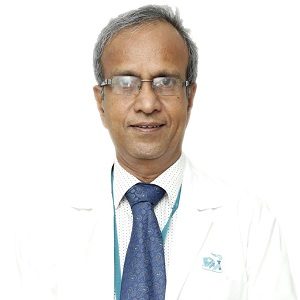Best Doctors in India for Alcoholic Hepatitis Treatment
- ENT Surgeon, Chennai, India
- Over 11 years’ experience
Profile Highlights:
- Dr. Vikram is one of the best young ENT specialists in Chennai with a clinical experience of 11 years.
- He offers services such as Tinnitus Management, Throat and Voice Problems, Foreign Body in the Eyes, Ears, Nose, and Throat, Functional Endoscopic Sinus Surgery – FESS and Tongue Tie Release, etc.
- Dr. Vikram contributed many publications to the National and International Journals.
- Endocrinologist and Diabetologist, Chennai, India
- Over 36 years’ experience
Profile Highlights:
- Dr. P G Sundararaman is one of the senior Endocrinologists in Tamil Nadu with an experience of 36 years in this field.
- Patients seek consultation for bioidentical hormone therapies for men and women, Thyroid Disorder Treatment, Gestational Diabetes Management, Growth Abnormalities, Endocrine Stem Cell Therapy, Lactation Counselling, etc.
- He keeps himself updated with the latest in the field by attending national and international conferences.
- Endocrinologist and Diabetologist, Chennai, India
- Over 26 years’ experience
Profile Highlights:
- Dr. Boochandran is one of the best Endocrinologists in Chennai, with 26 years of experience in diabetes and endocrinology.
- After completing his MBBS in Chennai, he went on to earn his Master’s degree from Kings College Hospital in London.
- Dr. Boochandran specializes in the treatment of hypothyroidism, obesity, parathyroid dysfunction, polycystic ovarian disease, and a variety of other endocrine gland disorders.
- Endocrinologist and Diabetologist, Chennai, India
- Over 38 years’ experience
Profile Highlights:
- Dr. Shantharam D is a renowned Endocrinologist & General Physician in Tamil Nadu, having 38 years of experience.
- The doctor has received many awards for teaching and service in the field. Dr. Shantharam keeps himself updated by attending workshops and conferences organized internationally or nationally.
- He is a faculty member for the PHFI’s certificate course in Evidence-Based Diabetes Management and the TN Government’s certificate course in Diabetes for practicing physicians, particularly those from rural Tamil Nadu.
- Dermatologist, Chennai, India
- Over 41 years’ experience
Profile Highlights:
- Dr. Ravichandran G is a renowned Dermatologist in Chennai with an experience of more than 34 years in the field as a specialist.
- Dr. Ravichandran has proven mastery in his work and earned a great reputation among his patients. He performed 2000+ vitiligo procedures to date.
- Dr. Ravichandran successfully framed his own therapeutic melanocyte transplant technique.
- Endocrine Surgeon, Chennai, India
- Over 22 years’ experience
Profile Highlights:
- Dr. Sai Krishna Vittal is one of the best Endocrinologists in Tamil Nadu who practices at Apollo Hospital, Chennai.
- As a board-certified endocrinologist with more than two decades of experience, Dr. Vittal offers consultation and treatment for male & female sexual problems.
- He is also a professor at The Tamil Nadu Dr. MGR Medical University and The Royal College of Surgeons of Edinburgh.
- Endocrinologist and Diabetologist, Chennai, India
- Over 33 years’ experience
Profile Highlights:
- Dr. Sivagnana Sundaram, a renowned endocrinologist in Chennai, specializes in diabetes treatment for patients.
- With 33 years of experience, he is India’s first DNB-qualified endocrinologist.
- Dr. Sundaram offers Lactation Counselling, Goiter Treatment, Hyper and Hypo Thyroid Treatment, Diabetes Management, and Gestational Diabetes Management to name a few.
- Dermatologist, Chennai, India
- Over 33 years’ experience
Profile Highlights:
- Dr. Murlidhar Rajagopalan is a renowned dermatologist with more than 33 years of experience. He works at Apollo Hospital, Chennai.
- Dr. Rajagopalan is a specialist in skin inspections, care, hardness, and polishing. He is deeply involved in pediatric dermatology, immuno-dermatology, and psoriasis.
- He is a verified peer reviewer at Publons.
- Endocrinologist and Diabetologist, Chennai, India
- Over 16 years’ experience
Profile Highlights:
- Dr. Narayanan N K is a well-respected endocrinologist in Chennai, having practiced for more than 16 years.
- Dr. Narayanan received the best abstract prize for his research on non-invasive lateralization tactics in the treatment of primary hyperaldosteronism. His poster presentation on Familial adrenocortical carcinoma has awarded as the best at the BES conference.
- Several of Dr. Narayanan’s research works have appeared in peer-reviewed journals published domestically and abroad.
- Dermatologist, Chennai, India
- Over 14 years’ experience
Profile Highlights:
- Dr. Shraddha M is one of the promising dermatologists in Chennai with nearly 14 years of dedicated experience in the field.
- Some of the services by Dr. Shraddha M include Laser Therapy, Chemical Peel, Acne Treatment, Hair Loss Treatment, Thread lift, Derma rollers, etc.
- She also had been Assistant Professor at Chettinad Hospital. Dr. Shraddha presented 9 papers in national and international journals.
Best Hospitals in India for Alcoholic Hepatitis Treatment
ALCOHOLIC HEPATITIS
Alcoholic hepatitis is a liver infection, which is mainly caused by frequent, heavy use of alcohol. Fat can build up in the liver cells, which might lead to inflammation as well as scarring of the liver.
Alcoholic hepatitis might be mild or severe. A patient might even need a liver transplant if proper treatment is not provided, or if they don’t stop consumption of alcohol.
It is also notable that all heavy drinkers don’t develop this condition, and sometimes this condition even develops in people who drink moderately. However, if you are diagnosed with this condition, it is important for you to quit drinking alcohol. People who continue drinking alcohol might face a huge risk of serious liver damage as well as death.
Symptoms
Depending on the amount of damage to the liver, the symptoms can vary. If you are having a mild form of the disease, you might not even experience any symptoms at all. However, as the damage continues to grow, you might experience the following:
- Changes in appetite
- Dry mouth
- Weight loss
- Pain or swelling in the abdomen
- Jaundice, or yellowing of the skin or eyes
- Fever
- Nausea and vomiting
- Easy bleeding or bruising
- Changes in your mental state, including confusion
- Fatigue
The symptoms of this condition are similar to those caused by a few other health conditions. Therefore, if you develop any of these symptoms, it is best to get a proper diagnosis as well as begin treatment.
Causes & risk factors
Alcoholic hepatitis generally develops when the alcohol you drink causes damage to your liver. However, it is not clear why alcohol does this damages only to some heavy drinkers.
Few factors that are known to play a role in this condition include:
- The body’s process that breaks down alcohol produces some toxic chemicals
- These chemicals can trigger inflammation that can destroy the liver cells
- Thus, over time, scars replace healthy liver tissue, thus interfering with the function of the liver
- This irreversible scarring, which is also termed cirrhosis, is the final stage of alcoholic liver disease
If you have hepatitis C and continue to drink, even moderately, you are more likely to develop cirrhosis.
Some heavy drinkers are also malnourished because they don’t eat a proper balanced diet. Alcohol and its byproducts also prevent the body from absorbing nutrition properly. Lack of nutrition can contribute to liver cell damage.
Some other risk factors that can lead to this condition include:
- Your sex- Women are usually at a higher risk of developing alcoholic hepatitis since the way alcohol is processed in women is different.
- Binge drinking- Having over five drinks within two hours for men and four or more for women can increase the risk of alcoholic hepatitis.
- Obesity- Heavy drinkers who are overweight are also more likely to develop alcoholic hepatitis and to progress from that condition to cirrhosis.
- Race and ethnicity- Hispanic and Negroid people might be at higher risk of alcoholic hepatitis.
- Genetic factors- According to studies, there may be a genetic component in alcohol-induced liver disease. However, it is difficult to separate genetic and environmental factors.
Diagnosis
If you are showing symptoms of alcoholic hepatitis, your doctor will first inquire about your medical history and alcohol consumption. Next, he/she will perform a physical exam to see if you have an enlarged liver or spleen. They might also need a few more tests to confirm your diagnosis, such as:
- Complete blood count (CBC)
- Liver function test
- Ultrasound of the liver
- Abdominal CT scan
- Blood clotting tests
In some cases, a liver biopsy might also be needed to confirm the diagnosis of alcoholic hepatitis. A liver biopsy requires your doctor to remove a tissue sample from your liver, which is then tested in the lab. This method helps to show the severity and type of liver disease.
Treatment
Stopping alcohol consumption is the most important treatment for alcoholic hepatitis. There is no cure for this condition, but treatment can help in reducing or eliminating symptoms, or stopping its progression.
It is also important to note that scarring of the liver is permanent, but treatment can aim to restore as much function as possible.
Dietary changes
Medication
Liver transplant
The best hope of recovery is to be aware of the signs and symptoms as well as to reduce, manage, or if possible, completely stop consumption of alcohol.
Complications
Alcoholic hepatitis might lead to severe other complications such as:
- Enlarged veins (varices)- In this condition, blood that is unable to flow freely through the portal vein, can back up into other blood vessels in your esophagus or stomach.
- Hepatic encephalopathy- This condition can be caused by the buildup of toxins if your damaged liver is unable to remove all the toxins from your body. It involves confusion, drowsiness, and slurred speech.
- Ascites- Ascites is a condition in which the fluid that accumulates in the abdomen may get infected and thus, require treatment with antibiotics. Although this condition is not life-threatening, it can be a sign of advanced alcoholic hepatitis, or cirrhosis.
- Kidney failure- A damaged liver affects blood flow to the kidneys, thus resulting in kidney failure.
- Cirrhosis- The scarring of the liver might lead to liver failure.
Prevention
Alcoholic hepatitis might be prevented if you take the following steps:
- Drink alcohol in moderation, if at all- For healthy adults, moderate drinking means no more than one drink a day for women of all ages and men older than 65, and not over two drinks a day for men aged 65 and younger. However, if you prevent all alcohol, it is a certain way to prevent this condition.
- Check before mixing medications and alcohol- Ask your doctor if it’s safe to drink alcohol while you are taking medications. Consider reading the warning labels on over-the-counter medications as well. Don’t drink alcohol when you are taking medications that warn of complications when combined with alcohol.
- Protect yourself from hepatitis C- Hepatitis C is an infectious liver disease that is caused by a virus. If it is left untreated, it may lead to cirrhosis. If you are having hepatitis C and you consume alcohol, you’re generally more likely to develop cirrhosis than if you don’t drink.















